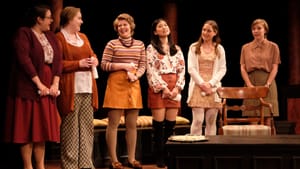Stay in the Loop
BSR publishes on a weekly schedule, with an email newsletter every Wednesday and Thursday morning. There’s no paywall, and subscribing is always free.
Commonalities abound
Princeton Summer Theater presents Wendy Wasserstein's 'Uncommon Women and Others'

The title of Wendy Wasserstein's 1977 play Uncommon Women and Others seems more cynical today than it did 40 years ago. In Princeton Summer Theater's (PST) revival, the angst-ridden awakenings of Mt. Holyoke College students circa 1972 seem quaint — but not irrelevant or outdated in the #metoo present. However, the program's glossary is required reading before the play starts.
The women’s tribulations and achievements are more universal and less "uncommon" today. We talk more openly now about women in careers and relationships as the independent equals of men, but equality is still far from fact.
Uncommon Women and Others is ensemble-driven, structured as a 14-scene montage of five friends' senior year, with framing scenes occurring at a reunion six years later in 1978. We see conflicts and bonding, love and loathing of old traditions, hope and fear about the future, and sexual experimentation and maturation, all combined with mixed results after graduation. What's surprising today is that there are few surprises.
Baby, you haven't come a long way
Director Daniel Krane's cast of nine young women — despite its 49-year history, PST is run by recent Princeton University grads — resist playing stereotypes. Kate (Kat Giordano), Samantha (Lydia Watt), Holly (Maeve Brady), Muffet (Rebecca Wei Hsieh), and Rita (Allison Spann) have shared their house for four years, supervised by housemother Mrs. Plumm (Carol Lee, too young, yet convincing and hilarious). They achieve a rapport that makes the sibling-like intimacy of dorm parties and late-night drinking sessions believable.
Less close to the quintet, but no less defined and genuine, are Susie (E Harper Nora Jeremijenko-Conley) and Leilah (Michelle Navis). Krane makes freshman Carter (Charmari White-Mink) a painfully shy recluse, though it means in early scenes that the others are shockingly oblivious to her discomfort. Since the actor is black, their aloofness seems racially motivated. However, casting diversity also means the play's themes about affluent white privilege aren’t as clear.

Krane's staging suggests that Carter, in the future, is writing what we're watching. She's stationed stage right, picking at a typewriter on Jeffrey Van Velsor's symmetrical dark wood set, which illustrates the venerable college's age and wealth. The purpose isn't clear and feels implausible. Carter doesn't attend the six-year reunion, so how does that end up in her play? Is what we see "real" or filtered through her outsider’s view?
What's college for?
Uncommon Women and Others, especially performed on a university campus by recent grads, hits some contemporary notes questioning higher education's purpose. The characters' aspirations are blunted by male-dominated society: though products of an elite Seven Sisters college, they're dismayed to discover that the jobs available to them require typing, photocopying, and servile drudgery that negate their academic achievements.
Men are the unseen arbiters of the characters' fates. Only one student seems focused and fulfilled — because she's engaged. Most appalling to modern audiences might be the Father-Daughter Weekend (abolished at Mt. Holyoke in 1974), at which it's common practice for the dads to engage in lecherous pursuit of their daughters' friends.
Uncommon Women and Others includes much humor — especially from Spann’s Rita, who makes spontaneous rebellions sparkle. But it's hard not to feel a bit glum afterward, especially since Krane allows the reunion scenes to drag, with characters often speaking to the audience instead of each other.
The late Wasserstein (1950-2006) reveals that despite her characters' hopes, our fears and problems don't resolve after college. They continue through life, especially for women blocked by a male-dominated society.
What, When, Where
Uncommon Women and Others. By Wendy Wasserstein, Daniel Krane directed. Princeton Summer Theater. Through July 22, 2018, at the Hamilton Murray Theater, Murray-Dodge Hall, Princeton University, Princeton, New Jersey. (732) 997-0205 or princetonsummertheater.org.
Sign up for our newsletter
All of the week's new articles, all in one place. Sign up for the free weekly BSR newsletters, and don't miss a conversation.
 Mark Cofta
Mark Cofta